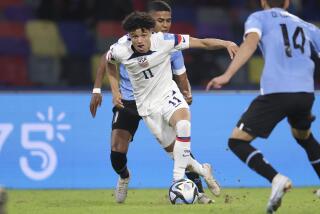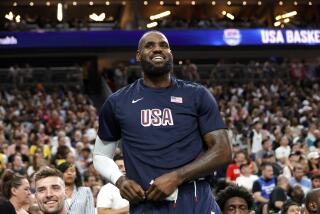Dispute Has U.S. in No Rush to Name Names
An announcement on the first members of the U.S. men’s Olympic hockey team will almost certainly be delayed while national and international agencies seek a consensus on how to implement the U.S. Olympic Committee’s edict that NHL players submit to no-advance-notice drug testing before the Salt Lake City Games.
Under an agreement made by the NHL, International Ice Hockey Federation and the NHL Players Assn., the six hockey powers--the United States, Canada, Sweden, Finland, the Czech Republic and Russia--were to name eight-12 players by March 25 and the rest by Dec. 22.
However, the U.S. Anti-Doping Agency, which conducts drug testing and results management for the USOC, said it must begin testing players by early summer, though it is willing to wait until after the NHL playoffs.
The roster selection dates “would not work,” said Terrence Madden, head of the USADA. “The March date is terrific, but in order to have out-of-competition, no-advance-notice testing, you need an extended period of time. They can do two things: They can name [a pool of] potential team members or actual team members.”
The NHL Players Assn. is concerned that Olympians from different countries might be subjected to different testing rules. The NHL shares that concern and would like to see uniform procedures established and overseen by the World Anti-Doping Agency.
The NHL does not oppose the USADA’s mission of testing for performance-enhancing drugs, steroids and drugs that mask steroids. It merely wants to be sure players from all countries play under the same rules.
And although the USOC’s decree raised some fears that NHL players might pull out of the Games, that won’t happen because the players’ association and the NHL see an Olympic hockey tournament played in North America under a TV-friendly schedule as a glorious marketing opportunity. Canadian hockey officials reportedly were set to announce their first eight Olympians on Saturday but postponed that while the drug-testing issue is negotiated.
“We don’t have a problem with the concept of random, out-of-competition testing of players who want to play in the Olympics,” said Bill Daly, an NHL executive vice president and its chief legal officer. “The question is how to apply that when you have the kind of logistics we have to deal with. . . .
“A patchwork kind of thing is what we’re trying to make sure doesn’t happen. When it comes to procedures and protocols, we want one common message. Our concern is to make sure we have all our ducks in a row.”
Daly and executives of the USOC, NHLPA, IIHF, USADA, WADA and International Olympic Committee met in various alphabet-scrambling combinations last week in Salt Lake City to sort things out. Daly acknowledged that the NHL had been surprised by the USOC’s decision; U.S. hockey players were not tested at Nagano in 1998, although some players from other countries were.
“They decided we had to have another piece to the puzzle,” he said. “It makes it more challenging. . . . Our meeting with the USOC was useful for getting a sense of what their needs and requirements are. I’m hopeful we’ll get a framework that satisfies everybody.”
Scott Blackmun, chief executive officer of the USOC, recognizes the NHL’s logistical problems but won’t back off on testing professional hockey, basketball and baseball players. Blackmun said he talked with NBA Commissioner David Stern about implementing testing for the 2004 Athens Games “and he told me he didn’t think it would be a problem.”
Blackmun said an accord on testing hockey players could serve as a blueprint for testing basketball players and other professional athletes who participate in the Olympics.
“We have to do what’s right for the U.S. Olympic team,” Blackmun said. “I understand that’s creating some headaches and challenges they need to address, but I’m hopeful it will all work out.
“We had been talking about this for at least a year. I think it really goes back to the fall of ‘98, the idea we want to treat all members of the [U.S.] Olympic team alike. And with all the activity in Sydney surrounding the U.S. attitudes toward anti-doping, it seemed like the timing was right to do this.”
Madden said tests will be conducted on U.S. athletes at the world junior baseball and basketball championships this summer.
“We feel the NHL has a wonderful opportunity here to lead other sports with players’ associations and set an example,” he said.
Representatives of USA Hockey talked with representatives of the NHL and the NHLPA on Friday but no announcement was made. IIHF executives will meet this week with officials of Swedish and Finnish doping agencies and report back to the NHL on those agencies’ willingness to let WADA oversee the testing. Blackmun said he expects to hear from the NHL this week to continue their talks.
“I definitely understand where they’re coming from and I’m hopeful other countries will name their teams early,” he said. “It puts us at a competitive disadvantage if we name ours early, and I hope we’ll be able to work everything out.”
IN THE OLYMPIC SPIRIT
The NHL has begun internal discussions on how to structure next year’s NHL All-Star game--to be played Feb. 2 at Staples Center--as a mini-preview of the Olympics, which will begin Feb. 8.
One intriguing idea is a trio of Olympic team exhibitions that would match Finland and Sweden, Russia and the Czech Republic, and the U.S. and Canada over two days. A separate global skills tournament would be held, and a rookie game might also be scheduled.
That format would also give the Olympic teams time to hold brief orientation sessions for their players. The 12-day break in the NHL schedule precludes holding training camps or multiple practices.
SHE’S A GOOD SKATE
Maria Garcia of Carson recorded a stunning victory in the 500 meters at the U.S. short-track speedskating championships last weekend and finished fourth overall in the final standings, but she can’t go to the World Championships because she’s too young.
According to International Skating Union rules, Garcia’s skating age is 14, a year younger than the minimum to compete in the world senior championships. The skating age is the competitor’s age as of the previous July 1, and Garcia turned 15 last September. Figure skating has the same rule.
Although Garcia can’t race in the world short-track team championships at Nobeyama, Japan, March 24, or the world short-track championships at Seoul the following weekend, she’s not pouting.
“It doesn’t really bother me,” she said. “I don’t want to accomplish too much too soon.
“I never really thought I was going to make it. Next year is what I was really looking at. The big thing is that I’ll be old enough to compete at the Olympics.”
Garcia will be eligible next season to race in senior-level international events and the Salt Lake City Games.
In winning the 500 last weekend in Blaine, Minn., Garcia defeated 1998 Olympians Amy Peterson, Caroline Hallisey and Erin Porter.
“I guess I skated really good,” she said. “I just wanted to show what I could do.”
Although she won’t be at the World Championships, Garcia still has a busy schedule. She leaves Monday to attend a relay camp in Salt Lake City, a gathering of top racers considered probable Olympians. Garcia is eager to skate in the 2002 Olympic city and picture herself there next February.
“It’s going to be awesome,” she said.
HERE AND THERE
Coby Miller, the U.S. indoor 200-meter champion, underwent surgery last week to repair a broken bone in his left leg. He was injured at the end of his meet-record 20.31 dash, apparently clipped by third-place finisher Shawn Crawford, who inadvertently collided with him. . . . Alan Webb, the first U.S. prep runner to run a sub-4-minute mile, set another national high school record last week with a time of 2:23.68 in the 1,000 meters at the Virginia High School League’s Group AAA indoor track and field championships. Webb, of Reston, Va., broke the record of 2:23.85 set in 1987 by George Kersh.
Groups that govern disabled sports in the U.S. have united under one national governing body, the U.S. Paralympic Corp. Charlie Huebner, formerly of the U.S. Assn. of Blind Athletes, was named director of Paralympic Sport Management for the organization, which will begin operations April 16.
A delegation from the IOC visited Toronto last week in its tour of prospective sites for the 2008 Summer Games. Toronto’s plan calls for many events along the lakefront and puts most venues within walking distance of the athletes’ village, minimizing transportation problems. . . . Short-track speedskaters Jade Wheeler of Los Alamitos, Lezleigh Jaworski of Long Beach and Alice Kim of Reseda earned junior elite status at last weekend’s U.S. championships and will compete in the Junior Olympics this summer. . . . Romanian medal-winning gymnasts Andreea Raducan and Andreea Isarescu are scheduled to compete in the Pontiac American Team Cup March 30-31 in Honolulu. Teams from Romania, the U.S. and China will compete.
Only 334 days until the Salt Lake City Winter Games.
More to Read
Go beyond the scoreboard
Get the latest on L.A.'s teams in the daily Sports Report newsletter.
You may occasionally receive promotional content from the Los Angeles Times.







